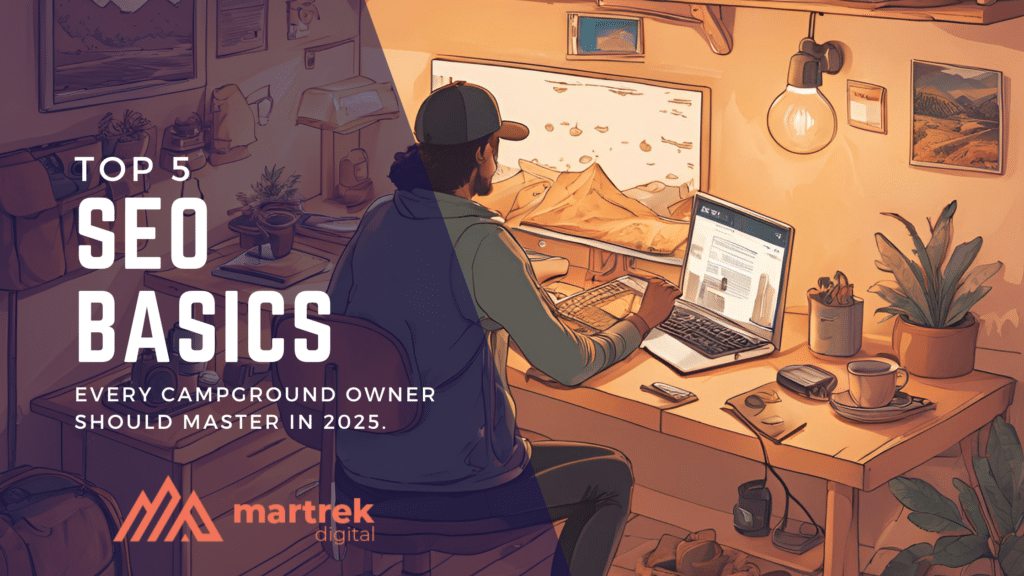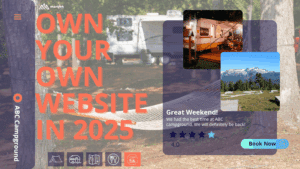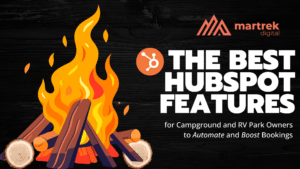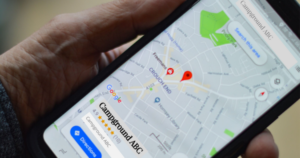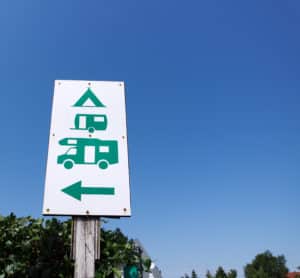Top 5 SEO Basics for Campground Owners Like You!
If your campground isn’t showing up on Google and/or Bing, your competitors might be scooping up your bookings. Search engine optimization (SEO) can be a game-changer for attracting campers and filling your sites—but it doesn’t have to be overwhelming.
We sat down with our in-house SEO expert, Tom Felgar, Head of Services here at Martrek Digital, to break down the SEO basics for campground owners and how it can help drive bookings and improve business strategy in 2025.
Here’s what they shared about getting started with SEO and the most impactful steps to take.
1. Keep Your Google Business Profile Updated
Your Google Business Profile is often the first thing potential campers see when they search for campgrounds. Think of it as your digital welcome mat.
From the Expert:
“I’ve seen family-owned campgrounds transform their online presence by simply optimizing their Google Business Profile,” says Tom. “Updating photos, listing amenities like Wi-Fi and RV hookups, and encouraging reviews can make a big difference in visibility and trust.”
💡 Quick Steps to Optimize:
- Add high-quality photos of your campsites, cabins, and amenities.
- Keep your hours of operation and contact information accurate.
- Ask happy campers to leave reviews and respond to them professionally.
When your Google Business Profile is up-to-date, it builds trust and helps you rank higher in local search results. We purposely make this the #1 item on our seo basics for campground owners for a reason- if people cannot find you, they cannot book. Period.
2. Use Keywords Campers Are Searching For
Keywords are the phrases people type into search engines when looking for places to stay, such as “RV parks near [city]” or “family-friendly campgrounds.” Using the right keywords on your website helps it appear in search results.
From the Expert:
“SEO is a zero-sum game,” Tom explains. “If someone else is ranking at the top of Google, you’re not. For campground owners, targeting local and amenity-specific keywords is key to standing out.”
💡 How to Start with Keywords:
- Identify phrases your campers might search for, like “campgrounds with full hookups near [city].”
- Add these keywords naturally to your website pages, especially in headings, meta descriptions, and blog posts.
- Focus on content that answers specific camper questions, like “Is your campground pet-friendly?”
By aligning your website content with camper searches, you make it easier for potential guests to find you online.
3. Make Your Website Mobile-Friendly
Over 50% of web traffic comes from mobile devices. If your website isn’t easy to use on a phone or tablet, you could be losing bookings to competitors.
From the Expert:
“A poorly structured website can be a major obstacle to rankings,” notes Tom. “I always recommend testing how your website looks and functions on mobile devices, especially since campers often search while on the road.”
💡 Mobile-Friendly Must-Haves:
- Make sure your site loads quickly—compress images and minimize clutter.
- Ensure your “Book Now” button is prominent and easy to click.
- Test your website on different devices to ensure smooth navigation.
A mobile-friendly site makes it easy for campers to find and book your campground, no matter where they are. As these tips on SEO basics for campground owners get more complex on the technical side, this is where you might want to bring in experts like our team here at Martrek Digital to help.
4. Create Content That Answers Questions
When campers search for campgrounds, they often have specific questions in mind. Creating content that answers those questions can help you show up in search results and establish trust with potential guests.
From the Expert:
“I’ve helped businesses build their reputation and drive traffic by creating useful, keyword-rich content,” Tom shares. “For campgrounds, this could mean publishing blogs about local attractions, seasonal events, or camping tips.”
💡 Simple Content Ideas:
- Write a blog post like “Top 5 Things to Do Near [Your Campground].”
- Add an FAQ section to your website answering common camper questions.
- Share tips for camping, such as “How to Pack for a Weekend Tent Trip.”
Engaging content not only helps with SEO but also builds relationships with your audience.
5. Avoid Common Technical SEO Pitfalls
SEO isn’t just about keywords and content. The technical aspects of your website can also affect your search rankings.
From the Expert:
“The most common technical mistakes I see include broken links, missing meta tags, and duplicate content,” says Tom. “Conducting regular SEO audits is essential to identify and fix these issues.”
💡 How to Avoid Mistakes:
- Use free tools like Google Search Console to check for errors.
- Fix broken links and ensure all pages have unique meta titles and descriptions.
- Regularly update your website to avoid outdated or duplicate content.
Taking care of these technical basics ensures that your website is in good health and easy for search engines to crawl.
Conclusion: Small Steps, Big Impact
SEO doesn’t have to be overwhelming. By starting with simple steps like optimizing your Google Business Profile, using camper-focused keywords, and creating helpful content, you can significantly improve your campground’s online visibility.
From the Expert:
“No two SEO journeys are the same, but most follow a similar blueprint,” Tom explains. “It’s about addressing the basics first—on-page, off-page, and technical SEO—and building a foundation for long-term success.”
Ready to make SEO work for your campground?
👉 Contact us for a free consultation to learn how Martrek Digital can help you build your online presence.
👉 Sign up for early access to the 2025 Ultimate Guide to Campground Marketing—releasing February 15, packed with tips to help you grow your business!
As always make sure you are following us on social media for more free tips and tricks for all things outdoor hospitality industry/digital marketing!

